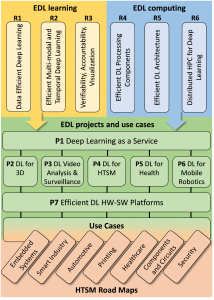 The EDL projects are fed by six research lines which act across project borders, assuring strong scientific synergy between academic and industry partners. The research lines are divided in two pillars:
The EDL projects are fed by six research lines which act across project borders, assuring strong scientific synergy between academic and industry partners. The research lines are divided in two pillars:
- The EDL learning research lines (R1 to R3) focus on novel DL methodologies with emphasis on efficiency. These research lines will bring forward novel scientific building blocks that fuel the innovations of the projects.
- The EDL computing research lines (R4 to R6) work together to make sure that the novel DL methodologies developed in R1-R3 are implemented efficiently on systems ranging from specialized, low power hardware to clouds.
R1: Data-efficient DL
R2: Efficient Multi-modal and Temporal DL
R3: DL Verifiability, Accountability and Visualization
R4: Efficient DL Processing Components
R5: Efficient DL Architectures
R6: Distributed HPC for DL
Goals
| Learning | R1 : Data efficient DL | 100 x less training data |
| R2 : Efficient Multi-modal and Temporal DL | 25 x faster analysis | |
| R3 : DL verifiability, Accountability and Visualization | Understanding DL | |
| Computing | R4 : Efficient DL Processing Components | 5 x less energy & flexible processing HW |
| R5 : Efficient DL Architectures | 100 x more efficient DL architectures | |
| R6 : Distributed HPC for DL | Much lower DL deployment cost |
